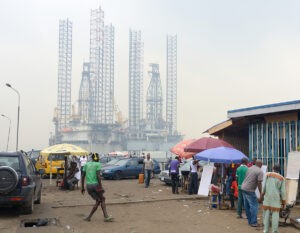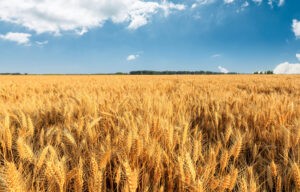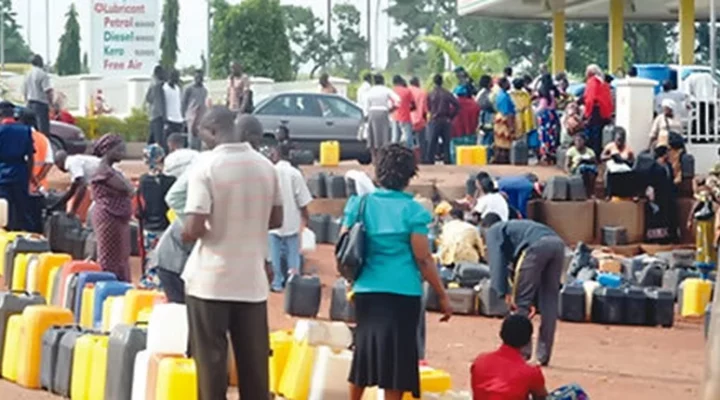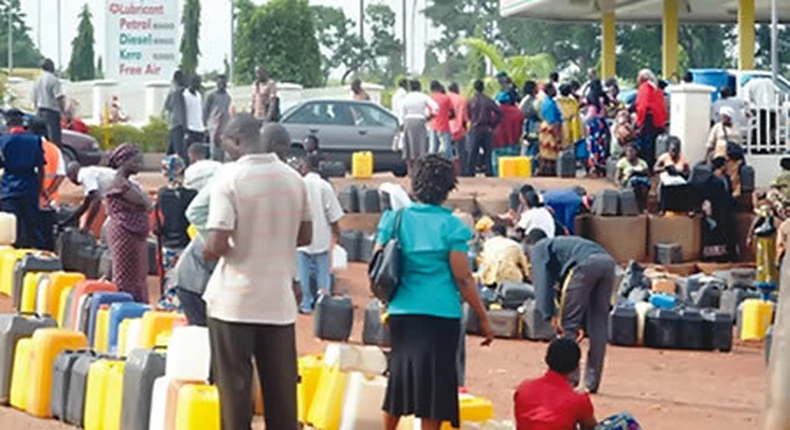As the war in Ukraine continues to rage on — leading to loss of lives and a refugee crisis in Poland, Hungary, Slovakia, Romania, Moldova and other countries — even the African continent, thousands of kilometers away, is feeling the heat of the war.
Thousands of African students and other professionals who were living in Ukraine were forced to abandon their schooling or work there, adding to the global diaspora. But there are other cascading economic effects on countries like Nigeria. The country of an estimated 210 million inhabitants is currently experiencing a fuel scarcity, with the lingering effect blamed in part on the war in Ukraine because Nigeria depends on fuel imports to keep its economy running.
Although the West African country is blessed with abundant oil and gas resources, decades of corruption and poor maintenance have combined to leave its refineries moribund and operating below capacity. To augment its local production, Nigeria is forced to import petroleum products.

Petroleum industry in Lagos harbor in Lagos, Nigeria. (Photo by Frédéric Soltan/Corbis via Getty Images)
With the panic created in the international market by the war in Ukraine, Nigeria found itself unable to stabilize the fuel scarcity that existed prior to the war. The result has been long queues at gas stations and people paying exorbitant fees for premium motor spirit (petrol) and diesel.
In normal times, a liter of petrol or diesel sold for average of N165 and N280 respectively (about 40 cents and 70 cents U.S.). But due to the current scarcity, these products — where available, which is mostly in the black market — are going for twice those amounts or more. Aviation fuel has increased in price by more than 100% in some instances.
In a country where the price of goods and services is indirectly linked to that of oil, prices of food and other essential commodities also have soared, adding to the inflation woes Nigerians have been groaning about in recent years in the face of perennial shortage of basic amenities like electricity.
South Africa inflation
In South Africa, rising food prices are now a feature of daily life and could worsen if the conflict in Ukraine continues.
David Masonda, the country’s deputy finance minister, recently said in an address to Parliament: “The conflict carries with it significant risk for the global and local economy, both of which are yet to be fully realized. The conflict will significantly intensify some of the risks that we have already highlighted in the budget review 2022.”
The laws of supply and demand ripple globally now.
“Higher fuel prices will aid inflation, which will in turn reduce the disposable income of consumers at a time when they are already struggling with the negative impact of COVID 19,” Masonda added. “Local fuel prices have risen to more than 21 rand a liter for the first time ever in March. This is unprecedented and has the potential to completely disrupt our economic recovery effort. This makes the work that we have embarked on with the department of mineral resources and energy to review the approach to fuel pricing, an urgent exercise. We are working tirelessly to complete the work as soon as possible.”
Even at that, Masonda said it would be dangerous to adopt a less-than-cautious approach to solving the problem. “We cannot make any hasty decisions as any changes we make on fuel pricing will have a lasting impact on the industry and the broader economy.”
War ‘casting a long shadow’

(123rf.com)
In some other African countries including Kenya, Malawi, Uganda and Somalia, residents complain about the high cost of commodities which, even if prices were not directly influenced by the events in Ukraine, are exacerbated by the uncertainty surrounding that war.
In an article for the Brookings Institution titled “What Does the war in Ukraine Mean for Africa?” Danielle Resnick states: “For several African countries, high dependence on wheat imports from Russia or Ukraine poses a further immediate concern. Jointly, the two countries constitute almost 30% of global wheat exports. Investors and market analysts have worried about Russia blockading Ukraine’s Black Sea ports, which would prevent Ukraine from exporting the remainder of last season’s wheat harvest.”
She added: “As in the rest of the world, Russia’s invasion of Ukraine on Feb. 24 is casting a long shadow across Africa. Despite the geographical distance, there are important ties between Ukraine and Africa, including more than 8,000 Moroccans and 4,000 Nigerians studying in Ukraine and over $4 billion in exports from Ukraine to Africa.”
And “although some African countries may benefit from a shift in global markets away from Russia due to the crisis, the short-term potential impacts on economic livelihoods are worrying while the implications for pan-African solidarity and adherence to multilateralism increasingly uncertain.”

Maurice Olobo
Maurice Olobo, a senior lecturer in finance and risk management at Uganda Christian University, told BNG that although Russia and Ukraine are not major trading partners with most of Africa, turbulence in Russia and Ukraine affects the African continent.
“The economic effects of the sanctions (against Russia by the U.S. and other Western countries) are likely to disrupt all supply chains globally. …. I see that African economies may not have direct linkages to the Russian economy but indirectly, Africa may be affected,” Olobo said. “Commodities that may be affected include oil and military hardware. Those are the two main commodities I see. These will then affect most of the other consumer commodities. Oil is an international market. it doesn’t matter where your oil is coming from but if (a leading) oil producer (Russia) is not producing, the effects will be felt.”
And it doesn’t have to be this way, Olobo added. “This war, in my opinion, is pointless. We live in the 21 century. I could not believe I was seeing such events unfold. Such actions of one country invading another should not be allowed in this era. The risk is that it may set a precedent around the world, and we may see other countries invading other countries.”
Who will fill the global shortage?
These challenges do present an opportunity for African nations to fill the global shortage on oil, he continued. “Now with sanctions biting, we are seeing major economies moving quickly to back fill that gap in energy. Africa needs to move in the same direction. … African countries with oil will soon see an opportunity to supply the global market to fill the shortage. Some of the countries would include Nigeria, Namibia, even Uganda, which is in its final stage of bringing their oil on the international market. But on the renewable energy front, we are seeing countries like Egypt and Rwanda moving quickly.”
And then there’s the China factor.
Amid the uncertainty of war, some analysts wonder how China might respond to the Africa’s emerging and shifting market where China already has a firm footing.
Amid the uncertainty of war, some analysts wonder how China might respond to the Africa’s emerging and shifting market where China already has a firm footing.
“I think Africa as a continent was moving away from Eastern Europe and focusing on the Asian markets, especially the Asian Tigers. So, it is important to wait to see what China says about the conflict and whether it would provide Russia an economic lifeline,” Olobo explained. “This is where Africans may be forced to take a position on these matters.”
Different paths for South Africa and Nigeria
For now, South Africa and Nigeria — both Africa’s leading economies — have taken stands on the Ukraine war. While Nigeria joined the rest of the world to denounce the Russian invasion of Ukraine at the United Nations, South Africa abstained from voting. South Africa is known to have warm relations with Russia, as both are members of BRICS — a group comprising Brazil, Russia, India, China and South Africa).
Olobo believes Nigeria’s stand was noble in the face of such attack on Ukraine by Russia.
“In the 21 century, the imperialism of human rights is the most desirable imperialism. We should stand for humanity first, then other (considerations) follow. I think Nigeria did the right thing and African countries should be proud of that and follow. What South Africa did, I think, was walking a tight rope and placing other considerations above those of human rights.”
At the moment, the concern of many Africans is twofold: How many of them said to make up a quarter of Ukraine’s 76,000 foreign students population displaced by the war can return to their studies in peace, and how millions of others across the African continent are able to sustain themselves in the face of inflation and a rising cost of living.
“We were wondering how long it could take for things to return to normal following the COVID crisis, only to begin to now talk of another crisis (Ukraine war) somewhere that we must pay for,” said Gift Ndulue, a resident of Lagos, southwest Nigeria. “It’s sad.”
Anthony Akaeze is a Nigerian-born freelance journalist who currently lives in Houston. He covers Africa for BNG.
Related articles:
Baptists in countries bordering Ukraine open their doors to fleeing refugees
Ethicists Without Borders issues statement on Russia’s aggression against Ukraine
Black and Asian refugees fleeing Ukraine face additional barriers, discrimination


